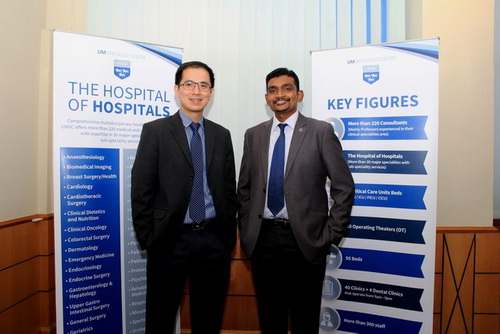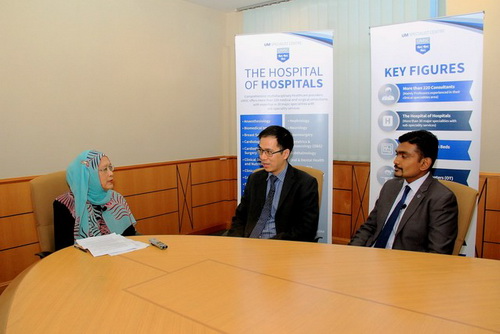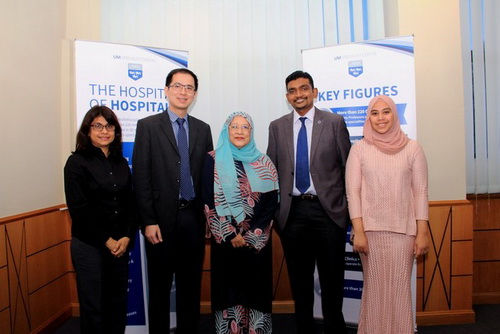Fatty Liver: Are Prescribed Medications The Culprit?

(Last of a Two-Part Interview)
By Salbiah Said
PETALING JAYA, Oct 15 (Bernama) -- There are currently no medications approved specifically for the treatment of fatty liver, doctors say.
The most effective treatment for the disease is a combination of healthy diet, exercise and weight control, according to UM Specialist Centre ( UMSC ) consultant gastroenterologist and hepatologist Prof Dr Chan Wah Kheong and consultant endocrinologist Dr Jeyakantha Ratnasingam.
Certain medications such as steroids, which are used to treat certain medical conditions, could contribute to fatty liver, Dr Chan told Bernama during a joint interview at UMSC here recently.
“A doctor will weigh the risks and benefits of prescribing a medication to the patient. If a patient requires steroids for treatment of a certain medical condition, it is important for him or her to continue the steroids.

UM Specialist Centre (UMSC) gastroenterologist and hepatologist, Associate Professor Dr Chan Wah Kheong (middle) and UMSC endocrinologist Dr Jeyakantha Ratnasingam (right) during an interview with Bernama at UMSC in Petaling Jaya recently. -- fotoBERNAMA by Nurul Zafirah (Intern)
The doctor would normally ensure that the patient is given the lowest possible dose to keep the disease under control. Or, he may change the steroids to some other medication that has similar effects, but do not have the side effects of steroids,” says Dr Chan.
IT'S NOT THE MEDICATIONS
"It is important for patients to be diagnosed and treated by a certified doctor, and not treat themselves. The doctor will weigh the benefits of a medication against its risks," he adds.
Dr Jeyakantha further clarifies that it is not the medications to treat diabetes mellitus that lead to fatty liver.
"The more obese or overweight you are, the higher your risk is to develop fatty liver. So it is actually the disease itself that contributes to fatty liver rather than the medications that are used to treat the disease.
The medications that are prescribed to treat diabetes actually bring down the sugar level and may help the patient to lose some weight, especially the newer types of medications for diabetes. That actually improves the fatty liver and not worsen the condition," says Dr Jeyakantha.
CHRONIC OVER-NUTRITION
Dr Chan stresses that over eating for a prolonged period of time can lead to obesity and related diseases, including fatty liver. Prescribed medications are not the primary culprit for fatty liver. Chronic over-nutrition is.
“In the past, fatty liver was assumed to be due to alcohol, but a clinician's findings in the 1980s changed the perception. Non-drinkers were also found to have fatty liver.
"What's common among these patients were that they were obese and had diabetes mellitus, hypertension and high cholesterol. That's how the term non-alcoholic fatty liver disease was coined," adds Dr Chan.
(Non-alcoholic fatty liver disease (NAFLD) is one of the types of fatty liver which occurs when fat is deposited (steatosis) in the liver due to causes other than excessive alcohol use. Non-alcoholic steatohepatitis (NASH) is the most extreme and fast progressing subtype of NAFLD).
Dr Jeyakantha says that soft drink is as hazardous as alcohol to the liver. A diet which is high in sugar and fructose actually fuels fatty liver similar to alcohol does.
"On the other hand, while smoking does not directly lead to fatty liver, it has a huge negative impact on the overall cardiovascular health, such as the risks of developing stroke and heart attacks,” he adds.
COMPLICATIONS OF CIRRHOSIS
Dr Chan adds that the number of patients admitted for complications of cirrhosis due to fatty liver is on the rise, and the patients were often not known to have liver disease prior to that. Cirrhosis is a condition in which the liver is severely scarred.

UM Specialist Centre (UMSC) gastroenterologist and hepatologist, Associate Professor Dr Chan Wah Kheong (second, left) and UMSC endocrinologist Dr Jeyakantha Ratnasingam (second, right) during a group photo session after an interview with Bernama at UMSC in Petaling Jaya recently. -- fotoBERNAMA by Nurul Zafirah (Intern)
"In the past, we often diagnose other causes of chronic liver disease in patients admitted for complications of cirrhosis, such as hepatitis B virus infection, hepatitis C virus infection or there may be a history of heavy alcohol consumption.
"These are common causes of chronic liver disease. However, more and more patients admitted for complications of cirrhosis nowadays do not have these conditions. Instead, they are obese and have diabetes mellitus, hypertension and dyslipidemia. Yes, they have fatty liver which has led to cirrhosis and its complications," he says.
"Diagnosis of fatty liver can easily be made by an ultrasound examination. Once fatty liver is detected, the doctor should assess the severity of the fatty liver.
"Fibroscan is a non-invasive test that could be easily performed to estimate the amount of scarring in the liver. A patient will require more aggressive management if there is cirrhosis of the liver to prevent the complications of cirrhosis,” explains Dr Chan.
LIVER CANCER
Patients with cirrhosis are at increased risk of liver cancer and should undergo regular ultrasound examination for early detection of liver cancer.
"When diagnosed early, liver cancer is potentially curable. However, if there is no surveillance for patients with cirrhosis (by performing regular ultrasound), they often present with liver cancer at a much later stage whereby a cure is not possible," says Dr Chan.
According to Dr Jeyakantha, once a patient is diagnosed with fatty liver, screening for other components of the metabolic syndrome, such as diabetes mellitus, hypertension and dyslipidemia is important.
"To be more holistic, on top of liver-focused investigations and management, as these individuals are at increased risk of heart attacks and stroke, preventing cardiovascular disease as a whole is very important," he adds.
"If a patient goes on a lifestyle change after being diagnosed with fatty liver, it can certainly help improve the disease," Dr Chan says.
-- BERNAMA
For more information click here
HealthEdge
EXCLUSIVE

Pet Vaccination, Public Awareness And Surveillance Key Towards Rabies-free Southeast Asia - Experts
KUCHING, Dec 11 (Bernama) -- The goal of making Southeast Asia free from human rabies can be achieved through a total understanding of the disease, how it can be prevented and responsible pet ownership among communities, say experts.
read more ››IN FOCUS

TAVI KAEDAH BAIK PULIH INJAP JANTUNG TANPA PEMBEDAHAN



